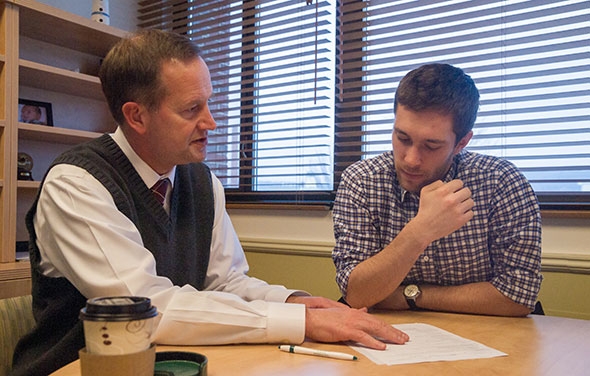Roger Woolsey wants to encourage employers to think about first-year and sophomore Dartmouth students in the same way a Major League Baseball scout thinks about a young prospect who shows great stuff on the mound.

Roger Woolsey, director of the Center for Professional Development, advises Sam Farnham ’14 to separate his volunteer work and his professional internships into stand-alone entries on his resume. (Photo by Eli Burakian ’00)
Woolsey, senior assistant dean and director of the Center for Professional Development, is working with his team and partners among faculty, staff, alumni, parents, employers, and the professional schools at Dartmouth to develop a two-year Professional Development Accelerator.
“We think of every first-year student as a start-up,” Woolsey says.
All newly accepted Dartmouth students, beginning with the Class of 2018, will be invited to take part in the accelerator program. Accepted students will be encouraged to refine their professional interests before they arrive in the fall.
When they arrive at Dartmouth, participants will be able to plug into the center’s broad network of resources, including connections with the new student innovation center and the Tuck School of Business; introductions to alumni who are leaders in fields such as the arts, law, and venture capital; advanced technical tools such as the job listing and recruitment website known as DartBoard; virtual job fairs and a resume guide organized by profession and industry; and other events focused on professional interests in a series known as Off the Green.
The accelerator program culminates with a program of sophomore summer conferences, laying the groundwork for the development of internship prospects during the junior year, Woolsey says.
“This new Dartmouth program is distinct among our peers in the Ivy League in that we are preparing our students for professional life from the start,” he says.
First, early workshops will focus on self-assessment, encouraging students to tease out and define their values and interests, develop time-management and organizational skills, and learn about the assets Dartmouth has to offer.
Then, for those who have a notion of where they are headed professionally, career exploration seminars will help those students get a better idea of an industry and specific companies, as well as graduate school opportunities. Students will do an industry profile, looking at the major players in a given field, revenue flow, national or international presence, salary ranges, and other statistical factors.
“If you understand an industry, its origins and place in the market, and can communicate that understanding, you are a much stronger candidate,” Woolsey says.
The third category of training—skills-based programming—helps students understand team management, conflict resolution, organizational psychology, and how to convey thoughts clearly and concisely.
Dare to Be Different
Woolsey, who runs through ideas with the rapid fire delivery of a pitchman at the top of his game, pauses, then brings the conversation around to the “new mantra” of the Center for Professional Development: “Dare to be different.”
It’s important, he says, to remind new students, his team, and parents that career development is not about forcing new Dartmouth arrivals to lock into a career choice. And all roads do not lead to the financial industries, he says, contrary to a common misconception. Most people will change jobs five to seven times in their working lives, says Woolsey, who was a business consultant, started two companies, and worked in the public sector before turning to career development.
“If I hear from parents: ‘Can you talk my son or daughter out of majoring in religion?’ The reply is, ‘No.’ ”
Pursue your passion, Woolsey tells students, and take advantage of the breadth of courses and opportunities at Dartmouth. He says his office functions as an aggregator of Dartmouth resources.
Woolsey spends a good part of his time talking with parents, alumni groups, and employers to spread the word about the great professional prospects of Dartmouth students, and he likes to talk about an analysis his office conducted on religion majors five years after graduation.
“Just nine are following faith-based careers. There are newspaper editors, nonprofit strategists, lawyers, academics, and yes, even investment bankers,” Woolsey says.
“So when a student says to me, ‘I don’t know what I want to do.’ I say, ‘good.’ ”
On November 19, Woolsey was interviewed by NHPR about his work with undergraduates.
